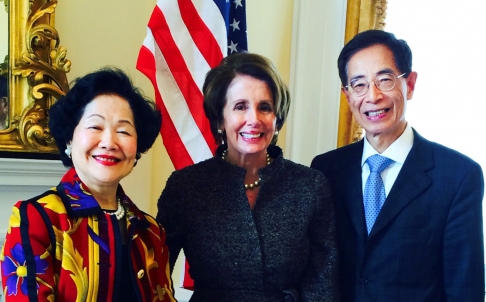Freedom for the plutocrats
- By Zhao Jinglun
 0 Comment(s)
0 Comment(s) Print
Print E-mail China.org.cn, April 12, 2014
E-mail China.org.cn, April 12, 2014
|
|
|
Anson Chan and Martin Lee with Nancy Pelosi. |
It is eminently logical for Martin Lee and Anson Chan, two of Hong Kong's prominent "democracy fighters" who have consistently fought the central government ever since Hong Kong's return to China, to go looking for help in Washington, which has a long record of interference in Hong Kong's affairs.
And they chose to visit Fred Hiatt's neocon Washington Post editorial page, as Hiatt is their natural soul mate.
Hiatt has characterized Russia and China as "anti-freedom." Sure, the United States is for freedom -- freedom for the plutocrats, as amply demonstrated by the Roberts Court ruling on the McCutcheon case announced on April 2.
It is well known that money buys political influence. It has always been a hallmark of American politics, but seldom so blatantly as today.
America's campaign finance laws, with their many loopholes, are meant to limit campaign contributions by the rich and by corporations. They are eviscerated by Citizens United (2003) and McCutcheon (2014), leaving precious little to deal with the grave problems of America's much vaunted democratic legitimacy.
In the majority opinion written by the Chief Justice John Roberts himself, he argued that the First Amendment invalidates aggregate campaign contribution limits. Three other conservative justices, Scalia, Kennedy and Alito concurred. While Justice Thomas, whose confirmation hearing was a scandal, wanted to go further, decrying all contribution limits: "limiting the amount of money a person may give to a candidate does impose a direct restraint on his political communication," and he moved to strike that provision down as well. Clarence Thomas, as the black Justice on the High Court, is on the far right, the reverse of Thurgood Marshall.
So, for the majority of justices, money talks.
In a blistering dissent Justice Stephen Breyer argued that the majority's "conclusion rests upon its own, not a record-based, view of the facts."
More importantly, Breyer argued, "Where enough money calls the tune, the general public will not be heard. A few large donations should not drown out the voice of the many."
So unlimited contributions, instead of being legitimized by the First Amendment, actually nullify it.
Why are voter turnouts so low in U.S. elections? Because the power of money is so strong, the public is losing interest in political participation.
A basic principle of political science is there has to be a wall between money and power -- legal rules that prevent money from transforming itself into power, and vice versa. The significance of the McCutcheon ruling is precisely the tearing down of that wall.
America's practice of money buying political influence not only prevails at home, but is also applied abroad. Washington has engineered several "color revolutions" by funding opposition NGOs. The latest example is Ukraine. U.S. Assistant Secretary of State for European and Eurasian Affairs Victoria Nuland actually bragged about investing US$5 billion in buying politicians, business groups and the media.
It is that kind of "democracy" Washington wants to spread throughout the world.
Now that U.S. Vice President Joe Biden has met with the Hong Kong twosome, he "underscored our long-standing support for democracy in Hong Kong," according to a White House statement. Just how is the U.S. vice president going to interfere in China's internal affairs, and what kind of "democracy" is he going to try impose on Hong Kong?
The author is a columnist with China.org.cn. For more information please visit: http://www.formacion-profesional-a-distancia.com/opinion/zhaojinglun.htm
Opinion articles reflect the views of their authors, not necessarily those of China.org.cn.






